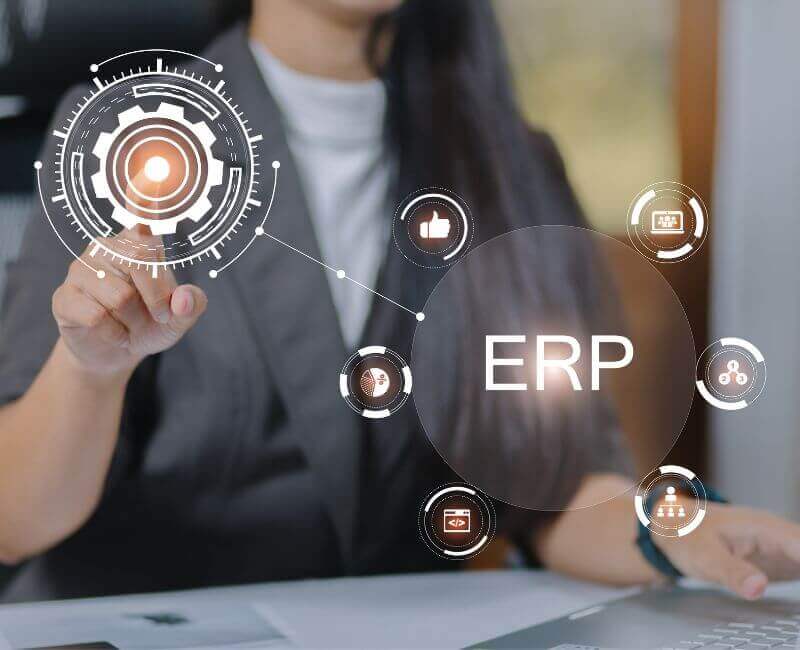What is ERP Application?
An ERP Application is a comprehensive system designed to integrate and manage the core business processes within an organization, and provide powerful reporting & data analytical tools for faster decision-making.
What is ERP Application Software?
An ERP (Enterprise Resource Planning) Application is a strategic tool that provides a centralized platform for businesses to automate their day-to-day business operations, from procurement, sales, and accounting to compliance. It comes with an integrated suite of modules that allow your business to identify & fix operational bottlenecks, capture new opportunities, and grow with confidence.
Using ERP software, businesses can automate processes, and get insights into critical data required to make key decisions. They can avoid problems that come with conflicting sources of data, and generate reports in real-time based on authentic information. An ERP is one of the most significant investments for modern businesses. It helps them become self-aware by integrating data from different aspects of the business such as customer support, finance, human resource, inventory, procurement, sales, and more.
Top Features of ERP Applications
Data Mining
ERP systems offer real-time insights into organizational data. Decision makers can analyze the data patterns, and formulate strategies to reduce costs and improve profitability.
Financial Management
ERP enables businesses to manage their day-to-day accounting and expenditure. It empowers decision-makers to get real-time insights and take quick & informed decisions. It also brings transparency and provides the management higher level of control over expenditure, profitability, and overall business growth.
Market Research & Analytics
ERP lets businesses track sales orders and prepare a comprehensive report over a particular period. They can use this consolidated data to analyze sales trends, perform market research, understand customer behavior, and use various techniques such as cross-selling, to boost sales and grab new opportunities.
Customer Relationship Management
Enterprise Resource Planning can help businesses provide superior customer service by providing all essential information in one place. Customer support agents get instant real-time access to key information such as customer profiles, order history, delivery tracking, complaints, etc.
Business Process Control
ERP makes complex business processes simple and gives you control over business operations. You can monitor and control day to day functioning of your business.
Mobile-friendly
ERPs have evolved a lot with time. Modern ERPs can be accessed remotely using cloud technology. Businesses do not have to invest in large computer networks, infrastructure, and workforce.
Sage X3 Transforming Businesses Globally!
Effortlessly streamline processes and achieve unparalleled business growth

Benefits of Using ERP Application
1. Reduces Operational Costs
Sage 300 ERP helps businesses turn their focus on reducing operational costs by automating various inventory operations and preventing overstocking & understocking. Its ability to keep track of inventory in real-time, and automatic purchase order generation, helps keep the inventory at optimal levels.
2. Improved Efficiency
Imagine having to look through a lot of physical files to find a small piece of customer information during a phone call. Enterprise Resource Planning ERP eliminates manual tasks and improves efficiency. An ERP can scan a huge dataset for required data, regardless of the department or store.
3. Increases Revenue
The Sales Management System can generate various sales tasks such as lead generation, order processing, etc. By automating these tasks, businesses can close deals faster, efficiently manage various marketing campaigns, expand their customer base, and increase their revenue.
4. Standardizes Manufacturing Process
ERP provides automation, quality control, and consistency throughout the entire manufacturing process. Standardizing the manufacturing process helps improve product quality, gain customer satisfaction, and reduce refund, replacement & warranty costs.
5. Regulatory Compliance
Meeting compliance requirements may not be an easy task. An ERP helps improve regulatory compliance by providing automated workflows, and audit trails, to keep up & stay compliant with the ever-changing government regulations.
6. Brings Transparency
Enterprise Resource Planning provides complete visibility among inter-departmental processes and every aspect of your business. It facilitates access to real-time, authentic information to improve business operations.
7. Centralized Source of Information
An ERP acts as a huge centralized database of organizational information. The data inside this database is constantly delivered to all departments within the company, either through on-premise servers or through the cloud systems.
8. Automates Business Processes & Functions
Enterprise Resource Planning software automates various tasks such as invoice generation, order processing, payroll management, etc. This not only cuts down on time and brings efficiency, but also eliminates duplicate entries and human errors.
Insightful Statistics into the ERP Application Market
India is witnessing a significant growth in the adoption of the ERP application in businesses across different industries of varying sizes. According to a research report by Statista, the market for the Indian ERP application is valued at $815 million as of 2025. It is expected to reach $1.16 billion by 2029.
Several factors are driving the popularity of the ERP application in India. Increased business complexities, the ever-changing nature of the demand-driven industry, and greater regulatory scrutiny are forcing Indian businesses to embrace new technological change and gain predictive analytics capabilities for better decision-making and streamlined business operations.
Top Functional Modules of ERP Applications
Production Planning
Production planning is a key challenge for many manufacturing companies. An Enterprise Resource Planning application helps it streamline the entire process right from the beginning with the procurement of raw materials, to the rolling out of the finished products.
Inventory Control
Businesses often face inventory-specific challenges which can affect their liquidity. For example, Excess inventory can cause lower liquidity, higher carrying costs, and higher insurance costs. The Warehouse Management System & Inventory Module in ERP Application helps you deal with these problems.
Sales Management
The Sales Module in the ERP application helps with invoice generation, order placement, order scheduling, and shipping of the product. It maintains a current and historical record of all transactions to forecast sales.
Financial Management
The Financial module in an ERP is beneficial to both profit and non-profit organizations. It helps generate ledgers, cash flows, and payables and provides accounts receivable automation. Businesses can also track financial data regardless of the subsidy company, currency, etc.
Human Resource
The Human Resource module lets businesses build a database of all of their employees, their salaries, attendance, performance evaluation, etc.
Customer Relationship Management
The CRM provides various sales pipeline management features. It makes it easier for businesses to store all customer information — including prospect information, date-time of phone calls and emails, important highlights of past conversations, and purchase history. They can also segment customers into groups for potential cross-sell opportunities.
The Ultimate Guide to ERP Application Success
Project Team Selection: For successful implementation, build a strong team of workforce with deep knowledge about business processes, and priorities, and has a record of staying on time & budget at all times.
Define Clear Vision & Requirements: Your ERP implementation should align with your business goals. Make sure to draft a clear vision, and requirements so that you can measure the success of your ERP implementation.
Communication: It’s important to communicate with internal and external stakeholders who will be affected by the ERP implementation. Active communication with them will help build trust.
Collect Feedback: ERP implementation can be a complex and challenging task. It has the potential to affect many parts of the business. Be sure to collect feedback throughout the entire process to understand risks and prepare for contingencies.

Take Your Business Control with Sage X3 ERP
Empower your team and elevate your results with ERP Software
The Next Wave of AI-powered Intelligent ERP Application
Integrating Artificial Intelligence (AI) into an ERP offers several benefits:
Layout Interpretation & Data Extraction: AI can intelligently detect the layout of different documents such as invoices, sales orders, and debit memos, and extract the relevant data from different fields without manual intervention.
Performance Benefits: Human work requires a lot of time and effort. AI can accurately process a large volume of data in a shorter span of time.
Adapt to Different Environments: The AI integration into an ERP can be scaled up to many use cases, depending on the needs and requirements of the business.
Operational Excellence: AI-integrated ERP analyzes large volumes of data, provides insights, and offers personalized recommendations to achieve operational efficiency. Ultimately, businesses gain a competitive edge.
Get Started with Sage ERP Application
Empower your business with smarter automation, deeper insights, and better agility in decision-making with the Sage ERP applications. Transform your business processes, make better forecasts, gain real-time actionable insights, and become proactive rather than reactive to changing market dynamics.
Sage X3 is the ultimate solution for businesses looking to gain access to best-in-class business-critical tools to grow their business presence, capture new opportunities, and operate more efficiently. Experience a seamless transformation and drive growth with an ERP tailored for your unique industry requirements.
Frequently Asked Questions (FAQ)

What is an ERP Application?
An ERP application software is a standalone system that optimizes different aspects of your business and promotes a smooth flow of information. The goal is to enhance operational efficiency and promote strategic decision-making.
What is ERP application used for?
An ERP application is used to streamline production activities, deliver a high-quality and more consistent experience to customers, manage and improve customer relationships, and drive sustainable growth through data-backed decision-making. It is used by businesses across the world to integrate their core functions and meet long-term strategic goals.
What is an example of ERP software?
Sage X3, Oracle NetSuite, and SAP are some of the most popular examples of ERP application. Many businesses across the globe leverage their innovative business models and deep analytical insights for strategic decision-making.
What is ERP Reporting?
ERP Reporting is the process of extracting and aggregating data across different business functions, and presenting it into intuitive charts, reports and customized dashboards to facilitate quick analytical insights and smart decision-making. ERP reporting empowers decision-makers to identify & manage risks in changing market dynamics, manage resources efficiently, and gain competitive advantage.
What are the key characteristics of an ERP application?
- Integrated Modules: ERP application eliminates disconnected systems with an integrated set of modules.
- Central Database: Consolidates databases across different sources and provides a Single Source of Truth.
- Streamlined Operations: Automates labor-prone tasks and frees up your staff for more productive operations.
- Real-time Data: Get deep strategic insights for faster & informed decision-making.
- Scalability: Supports your increased business needs as your company grows in size.
What are the benefits of an ERP application?
The following are the key benefits of deploying an ERP application:
- Improved Productivity: Enhance your company’s productivity and reduce operational bottlenecks.
- Informed Decision-making: Make timely informed decisions to improve your competitiveness and capture new opportunities.
- Seamless Collaboration: Collaborate between teams in real-time, and reduce errors & duplication.
- Mitigate Business Risks: Identify and mitigate risks to reduce the potential fines, penalties, and lawsuits.
- Save Costs: Develop new strategies to reduce operational costs and improve profit margins.
Is ERP a web application?
Sage X3 is a cloud-based Web application that comes with powerful Sage Intelligence and state-of-the-art capabilities. This cloud ERP allows businesses to adapt to changing market dynamics by providing access to business-critical information at their fingertips.
Schedule Product Tour
"*" indicates required fields
